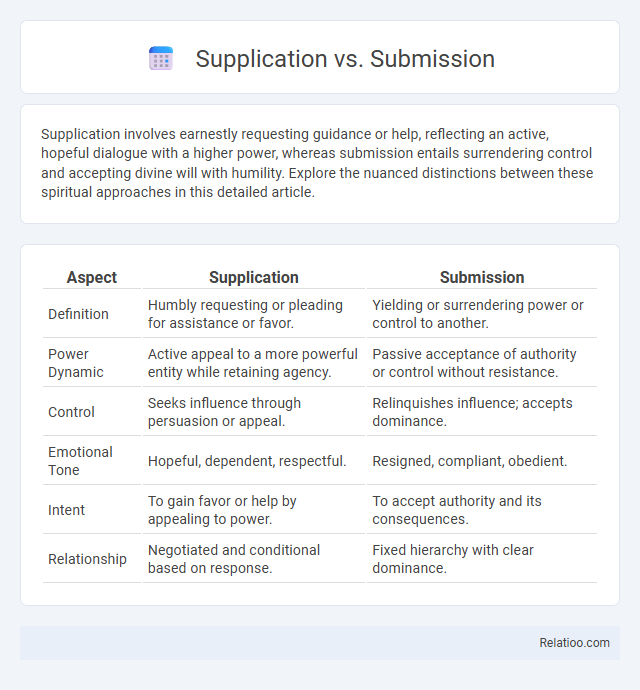Supplication involves earnestly requesting guidance or help, reflecting an active, hopeful dialogue with a higher power, whereas submission entails surrendering control and accepting divine will with humility. Explore the nuanced distinctions between these spiritual approaches in this detailed article.
Table of Comparison
| Aspect | Supplication | Submission |
|---|---|---|
| Definition | Humbly requesting or pleading for assistance or favor. | Yielding or surrendering power or control to another. |
| Power Dynamic | Active appeal to a more powerful entity while retaining agency. | Passive acceptance of authority or control without resistance. |
| Control | Seeks influence through persuasion or appeal. | Relinquishes influence; accepts dominance. |
| Emotional Tone | Hopeful, dependent, respectful. | Resigned, compliant, obedient. |
| Intent | To gain favor or help by appealing to power. | To accept authority and its consequences. |
| Relationship | Negotiated and conditional based on response. | Fixed hierarchy with clear dominance. |
Understanding Supplication: A Deep Dive
Understanding supplication involves recognizing it as a heartfelt and personal plea directed towards a higher power, expressing your deepest desires, needs, or gratitude. Unlike submission, which emphasizes surrender and acceptance of divine will, supplication is characterized by its active and intimate communication, reflecting earnest hope and faith. This distinction highlights the dynamic nature of your spiritual dialogue, where supplication serves as both a manifestation of vulnerability and a powerful request for guidance or intervention.
Defining Submission in Spiritual Contexts
Submission in spiritual contexts refers to the conscious and voluntary yielding of one's will to a higher power or divine authority, embodying trust and humility. It involves acceptance of divine guidance and surrendering personal desires to align with sacred principles or God's will. Unlike supplication, which is an act of petition or request, submission emphasizes obedience and complete devotion within religious practice.
Core Differences Between Supplication and Submission
Supplication is a humble request or prayer directed towards a higher power, emphasizing plea and dependence, whereas submission involves yielding or surrendering control to authority or will, highlighting obedience and acceptance. While supplication seeks intervention or help, submission reflects a state of compliance or resignation. The core difference lies in supplication being an active appeal, and submission representing passive acceptance.
Historical Perspectives on Supplication and Submission
Historical perspectives on supplication and submission reveal distinct cultural and religious connotations throughout civilizations. Supplication, often viewed as a humble plea or request to a higher power, has roots in ancient rituals where individuals sought divine intervention or mercy. Submission historically signifies acceptance of authority or control, frequently associated with social hierarchies and legal systems, reflecting obedience and surrender in both spiritual and secular contexts. Understanding these differences can deepen Your appreciation of their roles in historical narratives and religious practices.
Supplication in Major Religions and Philosophies
Supplication in major religions such as Christianity, Islam, and Hinduism involves heartfelt prayers or petitions directed towards a divine entity, symbolizing humility and dependence. In Islam, supplication (Du'a) is a vital practice emphasizing personal communication with Allah, while in Christianity, it often includes asking for guidance or mercy from God during prayer. Hinduism views supplication as a means to seek blessings and favor from deities, integrating it into rituals that reflect devotion and surrender.
Submission as an Act of Faith: An Overview
Submission as an act of faith embodies deep trust and surrender to a higher power, reflecting complete devotion beyond mere supplication or prayer requests. While supplication involves asking or pleading for divine intervention, submission signifies acceptance of divine will regardless of the outcome. Your spiritual journey strengthens as submission fosters humility, obedience, and unwavering belief in the greater plan.
Psychological Impacts of Supplication vs Submission
Supplication involves active seeking of help or guidance, often fostering feelings of hope and empowerment, while submission implies yielding control, which may lead to reduced autonomy and potential feelings of helplessness. Psychological impacts of supplication include increased resilience and positive coping strategies, whereas submission can result in passive acceptance and lower self-efficacy. Understanding these differences is crucial for mental health interventions aiming to enhance individual agency and emotional well-being.
The Role of Intent in Supplication and Submission
The role of intent in supplication distinguishes it from submission by emphasizing a conscious plea for divine intervention rather than mere acceptance of fate. Supplication involves an active, purposeful request driven by hope and trust in a higher power, while submission reflects a deliberate surrender to divine will regardless of outcomes. Understanding intent clarifies that supplication seeks engagement with the divine, whereas submission embodies acquiescence and faith in the prescribed path.
Cultural Interpretations and Practices
Supplication often manifests as a humble request for help, deeply embedded in various religious and cultural rituals, symbolizing a direct communication with the divine. Submission implies a broader acceptance of authority or fate, frequently seen in social and spiritual contexts as a form of surrendering control or ego. Cultural practices uniquely interpret these concepts: in Islamic traditions, supplication (du'a) emphasizes personal prayer and reliance on God, while submission (Islam itself means submission) reflects obedience to divine law, highlighting a dynamic interplay between asking and yielding.
Choosing Between Supplication and Submission in Personal Growth
Choosing between supplication and submission in personal growth hinges on the intent and mindset behind each practice. Supplication involves actively seeking guidance or help, emphasizing humility and openness to external support, while submission entails yielding to a higher authority or inner discipline, fostering acceptance and surrender. Balancing supplication's proactive seeking with submission's receptive acceptance can enhance self-awareness and resilience in personal development.

Infographic: Supplication vs Submission
 relatioo.com
relatioo.com